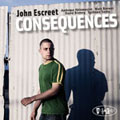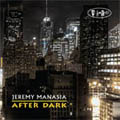The organ trio approach is one of the more drenched-in-the-tradition formats in jazz. From Wes Montgomery‘s Riverside recordings throughGrant Green‘s Blue Note sets up to Dr. Lonnie Smith‘s innovations, there’s always a feeling of timeless soulfulness to the grouping of guitar, Hammond B3 organ and drums.
Tel Aviv-born guitarist Yotom Silberstein, on Next Page, brings a reverence for that tradition, along with a hint of a Near Eastern tint, a nod to Bossa Nova, and a turn of the page in the American Songbook to go with his vibrant original tunes. Joining Siberstein is drummer Willie Jones III, organist Sam Yahel—who does his part to push the organ trio concept here, as well as on his own recordings and those with saxophonist Joshua Redman—with saxophonist Chris Cheek sitting in a several cuts.
The set opens with Silberstein’s “Borsht,” most certainly the only organ trio tune named after a Russian dish. It’s a relaxed, smooth-flowing and upbeat sound, with Silberstein displaying his clean, succinct notes in front of Yahel’s sweet whispering and Jones’ subtle bustlings, with ensemble gathering energy along the way. Cheek’s beautiful, hollow-toned saxophone joins the proceedings on a tune from Billie Holiday‘s songbook , “Fooling Myself.” The atmosphere here is lighthearted, buoyant and laidback.
Silberstein lifts a tune from his childhood with “Ani Eshtagea,” a Venezuelan folk song adopted by many Israeli singers. It’s a spicy, dance-inciting sound, with some of the guitarist’s hottest playing on the disc. “Cancao” is Silberstein’s tribute to Maurice Ravel, a step away from the organ combo soul into meditative beauty, with inspired blowing by Cheek.
“Blues for 007” opens with a stealthy guitar intro leading into the trio’s tribute to fictional international subterfuge. “Weekend in Mitzpe,” another Silberstein tune, celebrates Mizpe Ramon in the Judea Desert in Israel, and the American Songbook classic, “If Ever I Should Leave You,” gets a zingy, full-speed- ahead trio treatment. “Jalastra” is Silberstein’s dedication to the New York jazz scene, with Cheek’s saxophone singing with a gorgeous resonance.
Next Page, a nicely paced set, is a standout guitar/organ combo effort.


